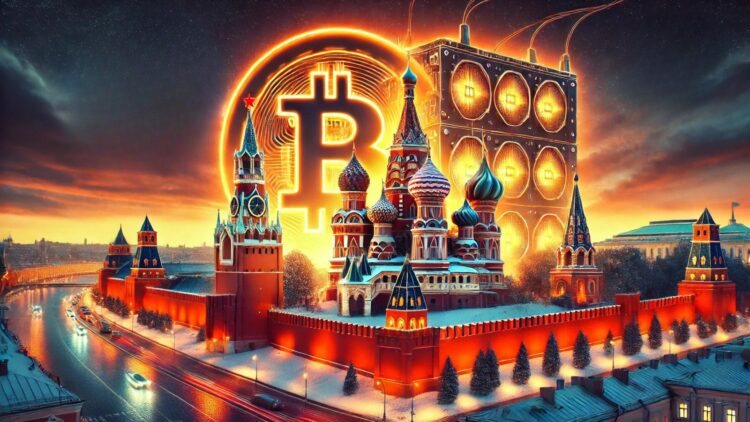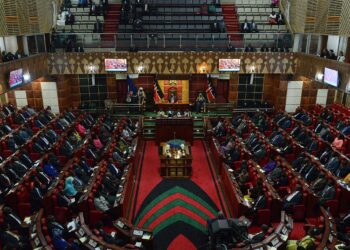In a dramatic shift from its previous stance, Russia has officially legalized cryptocurrency mining. This move comes just two years after the country considered banning Bitcoin and halting all crypto-mining activities. The change in policy is largely driven by Russia’s need to navigate the challenges posed by Western sanctions, which have caused substantial delays in international payments for businesses.
Since invading Ukraine in 2022, Russia has been hit with over 21,500 sanctions from the US, UK, EU, and other countries, including Australia, Canada, and Japan.

These sanctions have excluded Russia from the SWIFT interbank messaging system and targeted its financial assets, freezing approximately $350 billion (£276 billion) of its foreign reserves, accounting for about half of its total reserves.
Russia’s New Crypto Law = Strategy to Bypass Western Sanctions
According to a report by Russian news agency TASS, on August 8, Russian President Vladimir Putin signed a new law that legalizes crypto mining. The law, however, comes with a specific condition: only Russian citizens whose mining rigs operate within the government’s electricity limits are permitted to mine. This means only those using low-energy setups are allowed.
This new law didn’t come out of nowhere. It follows two important legislation passed by Russia’s State Duma in July 2024. The first law, effective on November 1, officially greenlights crypto mining in the country. The second law, kicking in on September 1, lets Russia’s central bank start exploring how to use cryptocurrency for cross-border payments. On the same date, the Bank of Russia will also launch three major initiatives that test cryptocurrency for international trade, enable crypto trading on official exchanges, and develop a platform for digital transactions within the National Payment System (NPS), according to reports from Russia’s state-owned news agency, Ria Novosti.
Russian central bank regulators supported the use of cryptocurrency to counteract Western sanctions. They have observed that these sanctions have made it increasingly challenging for local banks to conduct business with foreign companies. The Bank has since turned to digital currencies as an alternative solution. In 2023, Central Bank Chair Elvira Nabiullina approved the experimental use of cryptocurrency for foreign transactions.
Governor Nabiullina has also announced that Russia intends to begin its first international cryptocurrency payments by the end of 2024. The new law allows Russian organizations to use crypto for cross-border transactions, potentially alleviating some of the economic pressure. According to Bloomberg, by late May 2024, two major Russian metal producers began using the Tether stablecoin and other cryptocurrencies for transactions with Chinese clients and suppliers.
Potential Impact on the Crypto Industry
By passing this law, Russia is making it clear that it wants to be a key player on the global crypto stage and is ready to compete with the United States, Canada, Singapore, and other industry leaders. While this move could bring significant investments into Russia’s technology and energy sectors, it also presents potential challenges for the global crypto landscape.
Mati Greenspan, CEO of Quantum Economics, a firm specializing in crypto market research, explained that Russia’s shift toward cryptocurrency makes a lot of sense. Bitcoin transactions, in particular, are outside the control of traditional banks and governments, giving Russia a new level of financial independence.
Greenspan pointed out that while Russia might have hesitated to give its citizens such freedom in the past, the rise of Bitcoin in global trade has made it too important to overlook.
With U.S. sanctions pushing Russia into economic isolation, cryptocurrencies offer a fresh way for the country to conduct business with nations and companies that are cut off from traditional financial systems. By adopting digital assets, Russia is not just keeping up with the times but also positioning itself to have a say in the growing global digital economy.
As these dynamics unfold, the crypto market of the future may look vastly different from what we see today, potentially becoming a key player in the global financial system and a significant factor in international relations. The actions of major economies like Russia will play a crucial role in shaping this new financial landscape, setting the tone for global crypto adoption and regulation in the years to come.
Disclaimer: This article is intended solely for informational purposes and should not be considered trading or investment advice. Nothing herein should be construed as financial, legal, or tax advice. Trading or investing in cryptocurrencies carries a considerable risk of financial loss. Always conduct due diligence.
If you would like to read more market analyses like this, visit DeFi Planet and follow us on Twitter, LinkedIn, Facebook, Instagram, and CoinMarketCap Community.
“Take control of your crypto portfolio with MARKETS PRO, DeFi Planet’s suite of analytics tools.”





















